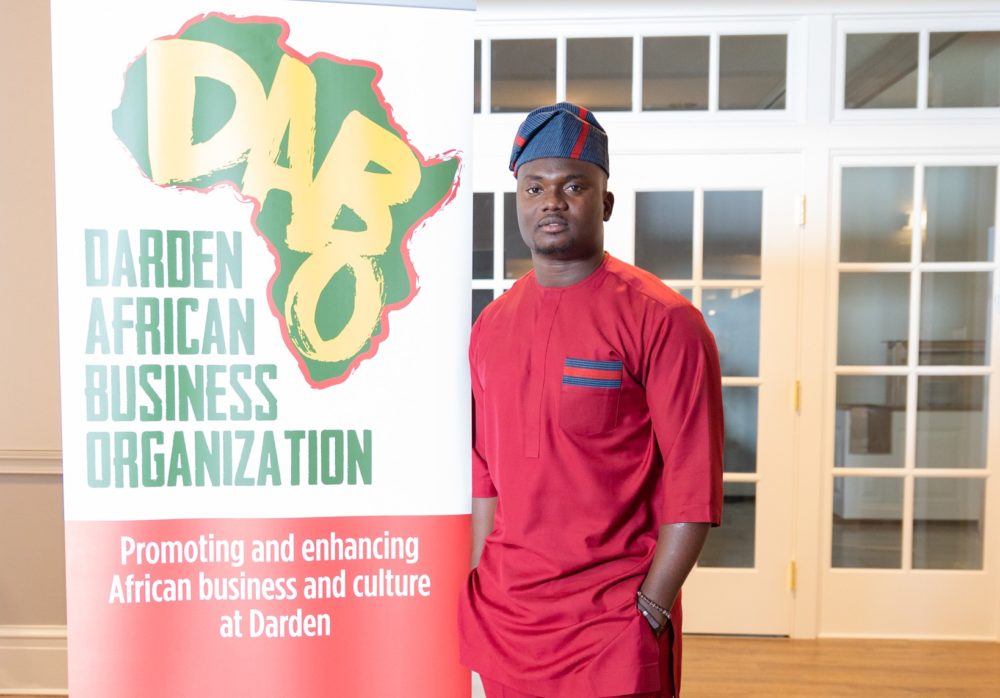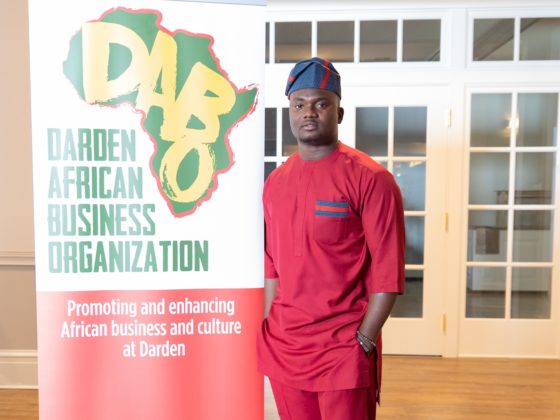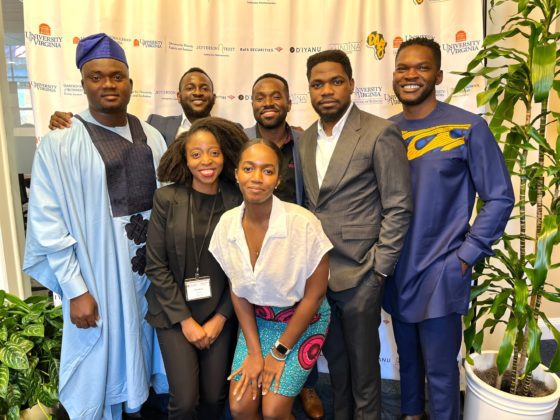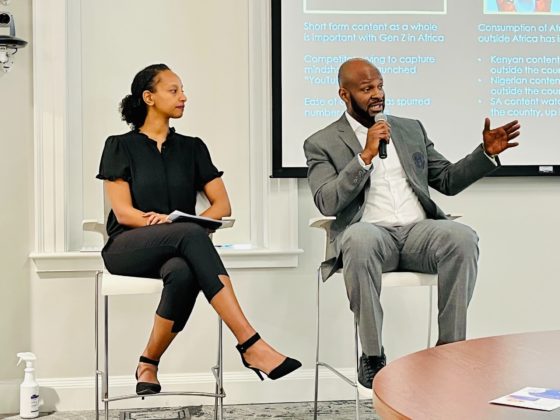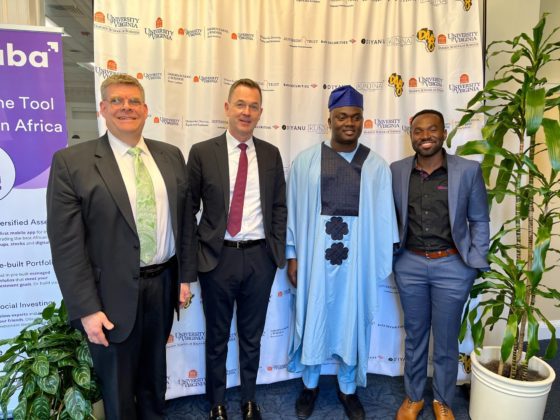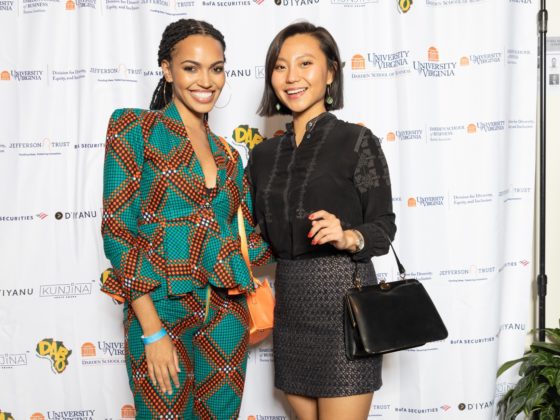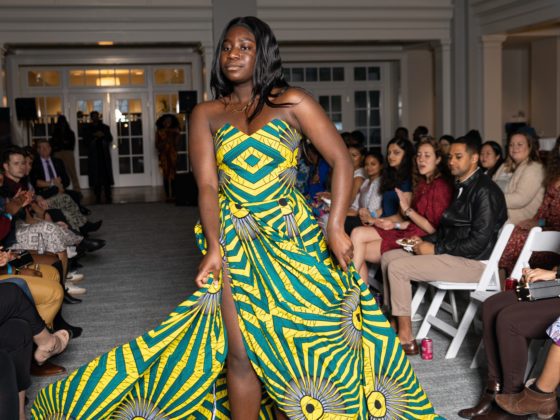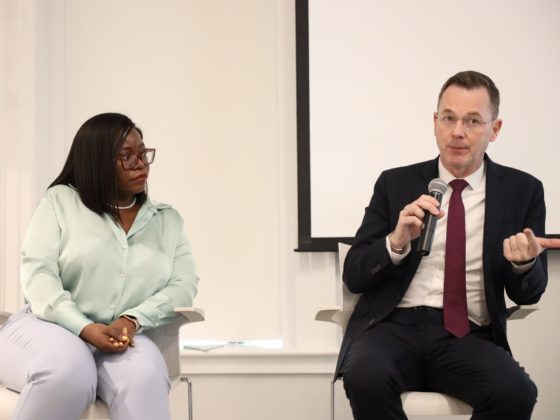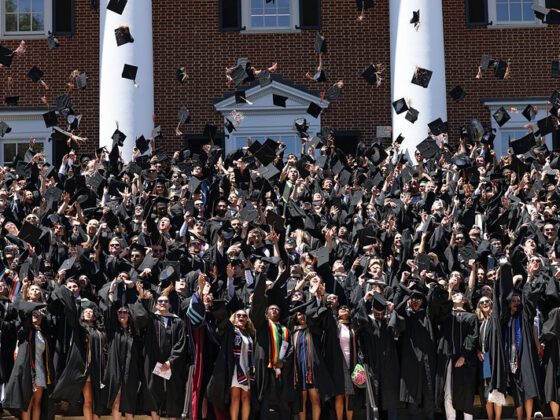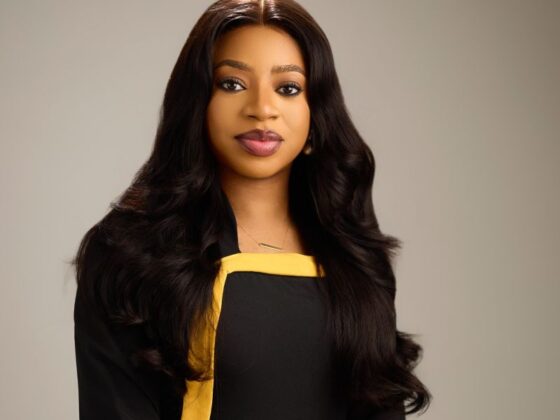Seun Adeboro (Class of 2022), outgoing president of the Darden African Business Organization (DABO), recently shared a Q&A featuring his journey to Darden and highlighting the Africa Economic Conference, held over two days at the beginning of April. The event featured a hybrid schedule of in person and virtual speakers, and a fashion show. The speaker series programming also included the following session topics:
- The Creative Economy’s Role in Driving Development in Africa
- Digital Creators in Africa: The Rise of the Digital Creators
- The Future of Storytelling in Africa: Augmented Reality, Comics, and Beyond
- Afrobeats Beyond Africa: Opportunities for Growth Throughout the Industry
- Financing the Creative Economy in Africa
- Recreating Trends and Exporting African Fashion around the World
DABO is one of Darden’s student-run affinity clubs, and cites its primary goal as “contributing to the learning environment, diversity and global leadership initiative at Darden by providing students and faculty an opportunity to learn more about African businesses, economics, cultures and politics.”
Q: Who are you? What’s your background?
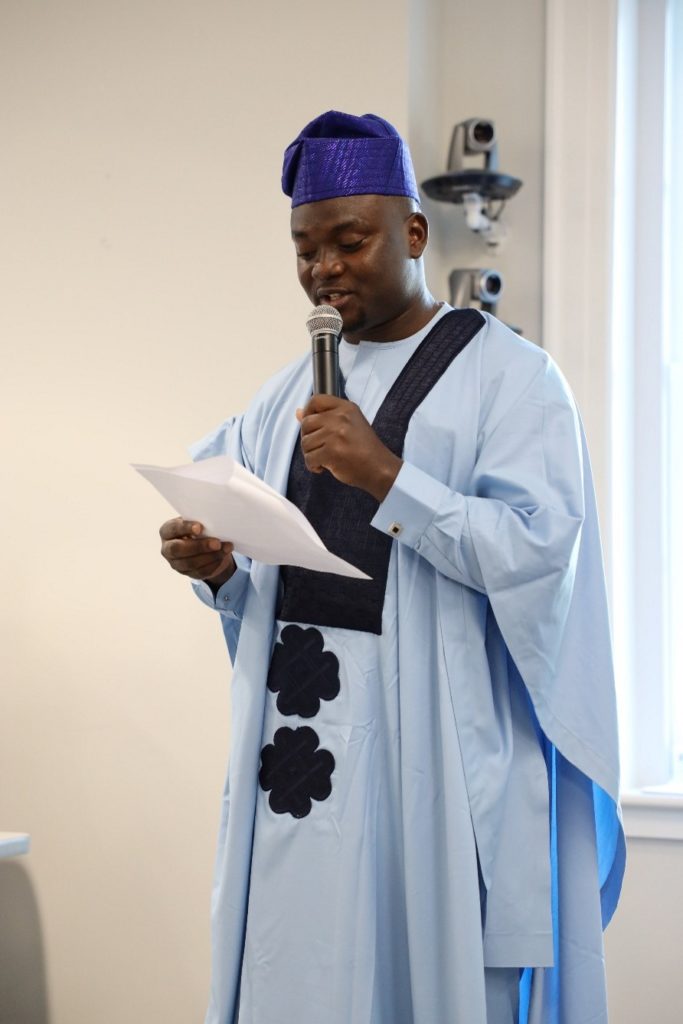
A: My name is Seun Adeboro, and I am currently a Second Year Full-Time MBA student at Darden — and will be an alum in just a few weeks. I was born in Nigeria and I lived and worked there before coming to Darden. I enjoy playing and watching sports, cooking and sometimes enjoy doing nothing at all! Before Darden, I played professional cricket, worked in HR and Market Strategy at Procter & Gamble, led city marketing in a contract role at Uber, and led a Business Development team at Paga, a fintech firm headquartered in Nigeria.
Q: How did you decide to pursue an MBA? What led you to Darden?
A: I knew I wanted an MBA while I was still an undergrad. I had heard about the MBA degree after attending an internship briefing of one of the global investment banks in Lagos, and earning my MBA became a medium-term goal after that experience. Deciding to get an MBA was an easy decision, but selecting the schools to apply to and attend was much harder. I ended up prioritizing Darden because it checked the box on almost all the things that were important to me. Conversations with Darden admissions and current students played a large part as well. I wanted an MBA experience in a small city with sports facilities, great career outcomes for its students, scholarship opportunities, strong faculty members and global focus. It was an easy decision after I received the admissions acceptance call!
Q: You are one of the leaders of the Darden African Business Organization (DABO). What attracted you to this role?
A: I was the 2021-22 President of Darden African Business Organization. Coming from Nigeria to the United States for an MBA, I had to give up a lot of things I was used to. Our food, music, culture and general way of life are different from what you will find in the U.S. It was also an opportunity for me to learn more about other parts of Africa. Africa has 54 countries with different political and business environment. I ran for the position of president to contribute to the global awareness of the Darden MBA. Africa has a lot to offer Darden and I wanted to be in a position to influence how Africa is viewed and how we help the students, faculty, and other stakeholders improve their knowledge of African business methods, music, food and culture.
Q: Looking back over the academic year, what have been some of the highlights of DABO’s work this year?
A: We became more ambitious this year and we designed and implemented many programs that contributed to our primary goal of contributing to the learning environment, diversity and global leadership initiative at Darden. We hosted welcome events for our incoming First Years to give them a soft landing at Darden, and we had two tables – Nigeria and Ghana – at the annual Global Food Festival. 40 other countries from Europe, Asia, South America,
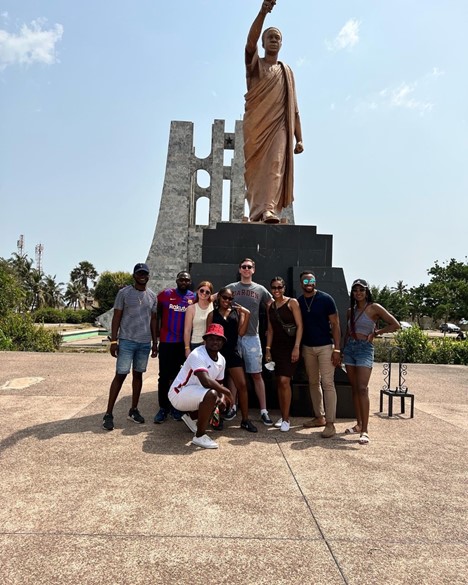
and North America participated, but Nigeria won the award for the best meal at the festival! We hosted many prospective students events virtually and in-person in Kenya, Ghana and Nigeria. We also created a mentorship program for our First Years. I’m also proud to share that all African First Year students were successful in their internship recruiting. We coordinated an African trip to Ghana and Nigeria for our Second Year class, and we ended the year by organizing the first Africa Economic Conference, which was a huge success. The DABO Board and the conference planning team put in a lot of work and I thank them for their service.
Q: DABO just hosted the Economic Conference – tell us more about the inspiration behind this year’s event and why you all decided to open up the conference to beyond the Darden community?
A: This year, we rebranded the traditional Africa Business Week to the Africa Economic Conference to drive more impact and reach. Our theme for the conference was ‘Emerging Trends in Africa’s Creative Economy’. We wanted to show the connection between Africa’s economic development and its creative industry. Africa’s creative industry has gone through massive transformation in the past two decades, but not enough is being discussed about it, especially in the business school environment. We thought people beyond Darden could benefit from participating in the conference, and we also wanted to leverage the conference to enhance current students and DABO alumni relationships.
This year, our former DABO President, Meti Aberra (MBA ’20) and alumni Damisola Akolade-Yilu (MBA ’20) attended the conference in person, and it was great to connect with them. We had participants from the University of Virginia undergrad, other UVA graduate programs, students from Wharton, Duke and Columbia, as well as prospective students from Africa. Executive leaders of our sponsors from the Jefferson Trust and the Batten Institute, as well former CEO of Save the Children and Darden Executive Fellow, Carolyn Miles were all in attendance. The conference team worked on the conference for 5 months before everything came to life!
Q: What were your favorite events or takeaway messages from the Conference?
A: The conference was over two days and it included many elements. We had a fashion show that featured costumes from West and East Africa, an art exhibition, dance performances from West Africa, Africa poems, a business pitch competition with applications from Kenya, Nigeria, Ethiopia, Liberia, and Ghana, and keynote speakers. We also hosted an Afrobeats x Amapiano Party. The business pitch competition winners are making impacts across Africa, and we were able to award $5,000 in funding to them.
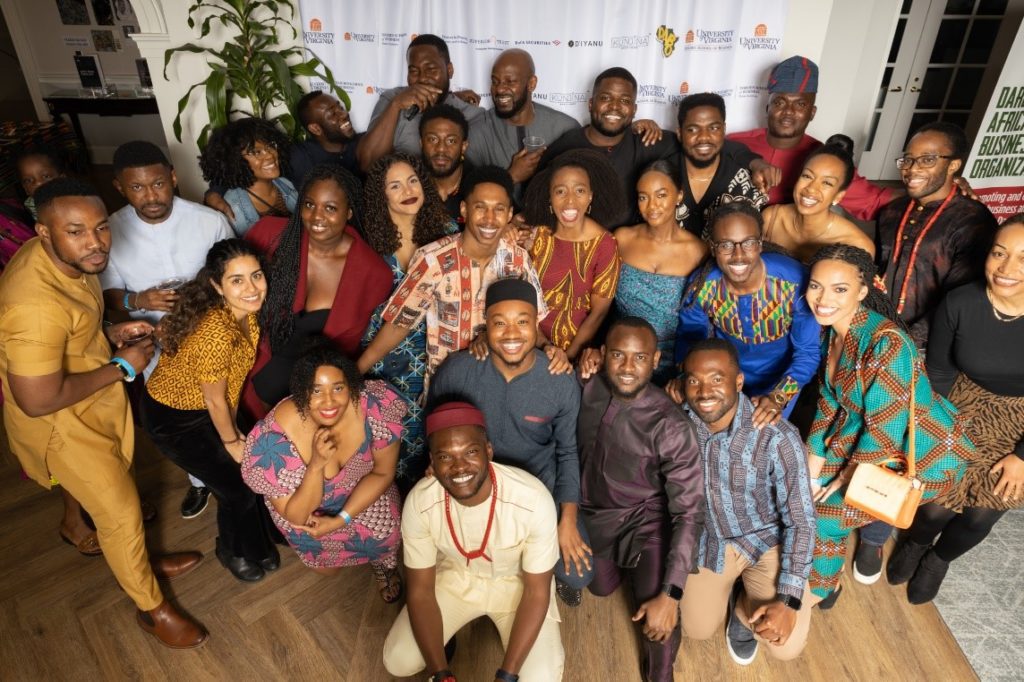
Our five engaging keynote speakers included Jocelyne Muhutu-Remy, Managing Director Spotify Sub-Saharan Africa; Alex Okosi, Managing Director Emerging Markets, YouTube EMEA; Sergio Pimenta, Vice President for Africa, International Finance Corporation; Hamid Ibrahim, Co-founder/Creative Director, Kugali Media; and George Gachara, Managing Partner at HEVA Fund.
Q: Lastly, any words of advice for prospective students?
A: Darden offers so many opportunities for you to make impact on any scale that you want. There are many people and resources available to help you achieve your goals, however, it is important to understand your goals and the things that are important to you. That will help you prioritize what you spend your time on. As an African at Darden, the School will offer you a lot, but there is also a lot that you can offer the school. Come as you are and don’t try to be anyone else. Everyone can shine at Darden.

